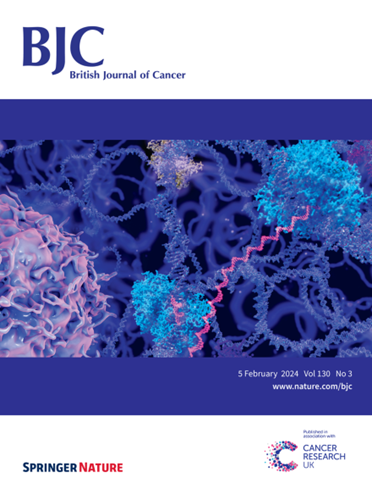Associations of blood lipids and LDL cholesterol lowering drug-targets with colorectal cancer risk: a Mendelian randomisation study
IF 6.4
1区 医学
Q1 ONCOLOGY
引用次数: 0
Abstract
Whether blood lipids are causally associated with colorectal cancer (CRC) risk remains unclear. Using two-sample Mendelian randomisation (MR), our study examined the associations of genetically-predicted blood concentrations of lipids and lipoproteins (primary: LDL-C, HDL-C, triglycerides, and total cholesterol), and genetically-proxied inhibition of HMGCR, NPC1L1, and PCSK9 (which mimic therapeutic effects of LDL-lowering drugs), with risks of CRC and its subsites. Genetic associations with lipids were obtained from the Global Lipids Genetics Consortium (n = 1,320,016), while genetic associations with CRC were obtained from the largest existing CRC consortium (n = 58,221 cases and 67,694 controls). Our main analysis was a multivariable MR (MVMR) with mutual adjustments for LDL-C, HDL-C, and triglycerides. Secondary analyses, including MVMR additionally-adjusting for BMI or diabetes, were also performed. Genetically-predicted LDL-C was positively associated with CRC risk in the MVMR adjusted for HDL-C and triglycerides (OR = 1.09; 95%CI 1.02–1.16 per SD increase) and additionally-adjusted for BMI (OR = 1.12; 95%CI 1.05–1.21) or diabetes (OR = 1.09; 95%CI 1.02–1.17). Associations were generally consistent across anatomical subsites. No clear evidence of association was found for other lipids, lipoproteins, or LDL-lowering drug-targets. We found evidence of a weak positive association between LDL-C and CRC that did not appear to be explained by potential pleiotropic pathways such as via HDL-C, triglycerides, BMI, or diabetes.

血脂和降低低密度脂蛋白胆固醇药物靶点与结直肠癌风险的关系:孟德尔随机研究。
背景:血脂是否与结直肠癌(CRC)风险有因果关系仍不清楚:血脂是否与结直肠癌(CRC)风险有因果关系仍不清楚:我们的研究采用双样本孟德尔随机化(MR)方法,考察了遗传预测的血脂和脂蛋白(主要包括:低密度脂蛋白胆固醇、高密度脂蛋白胆固醇、甘油三酯和总胆固醇)的血液浓度,以及遗传因素对HMGCR、NPC1L1和PCSK9(模拟降低密度脂蛋白药物的治疗效果)的抑制作用与CRC及其亚位点风险的关系。与血脂的遗传关联来自全球血脂遗传学联盟(n = 1,320,016),而与 CRC 的遗传关联来自现有最大的 CRC 联盟(n = 58,221 例病例和 67,694 例对照)。我们的主要分析是多变量 MR(MVMR),并对低密度脂蛋白胆固醇、高密度脂蛋白胆固醇和甘油三酯进行了相互调整。我们还进行了二次分析,包括对体重指数或糖尿病进行额外调整的多变量死亡率分析:结果:在根据 HDL-C 和甘油三酯调整的 MVMR 中,遗传预测的 LDL-C 与 CRC 风险呈正相关(OR = 1.09;95%CI 1.02-1.16,每 SD 增加),并根据 BMI(OR = 1.12;95%CI 1.05-1.21)或糖尿病(OR = 1.09;95%CI 1.02-1.17)进行额外调整。各解剖亚位点的相关性基本一致。其他血脂、脂蛋白或降低低密度脂蛋白药物靶点均未发现明确的相关证据:我们发现了低密度脂蛋白胆固醇(LDL-C)与儿童癌症之间存在微弱正相关关系的证据,这种关系似乎无法通过潜在的多效应途径(如通过高密度脂蛋白胆固醇、甘油三酯、体重指数或糖尿病)来解释。
本文章由计算机程序翻译,如有差异,请以英文原文为准。
求助全文
约1分钟内获得全文
求助全文
来源期刊

British Journal of Cancer
医学-肿瘤学
CiteScore
15.10
自引率
1.10%
发文量
383
审稿时长
6 months
期刊介绍:
The British Journal of Cancer is one of the most-cited general cancer journals, publishing significant advances in translational and clinical cancer research.It also publishes high-quality reviews and thought-provoking comment on all aspects of cancer prevention,diagnosis and treatment.
 求助内容:
求助内容: 应助结果提醒方式:
应助结果提醒方式:


